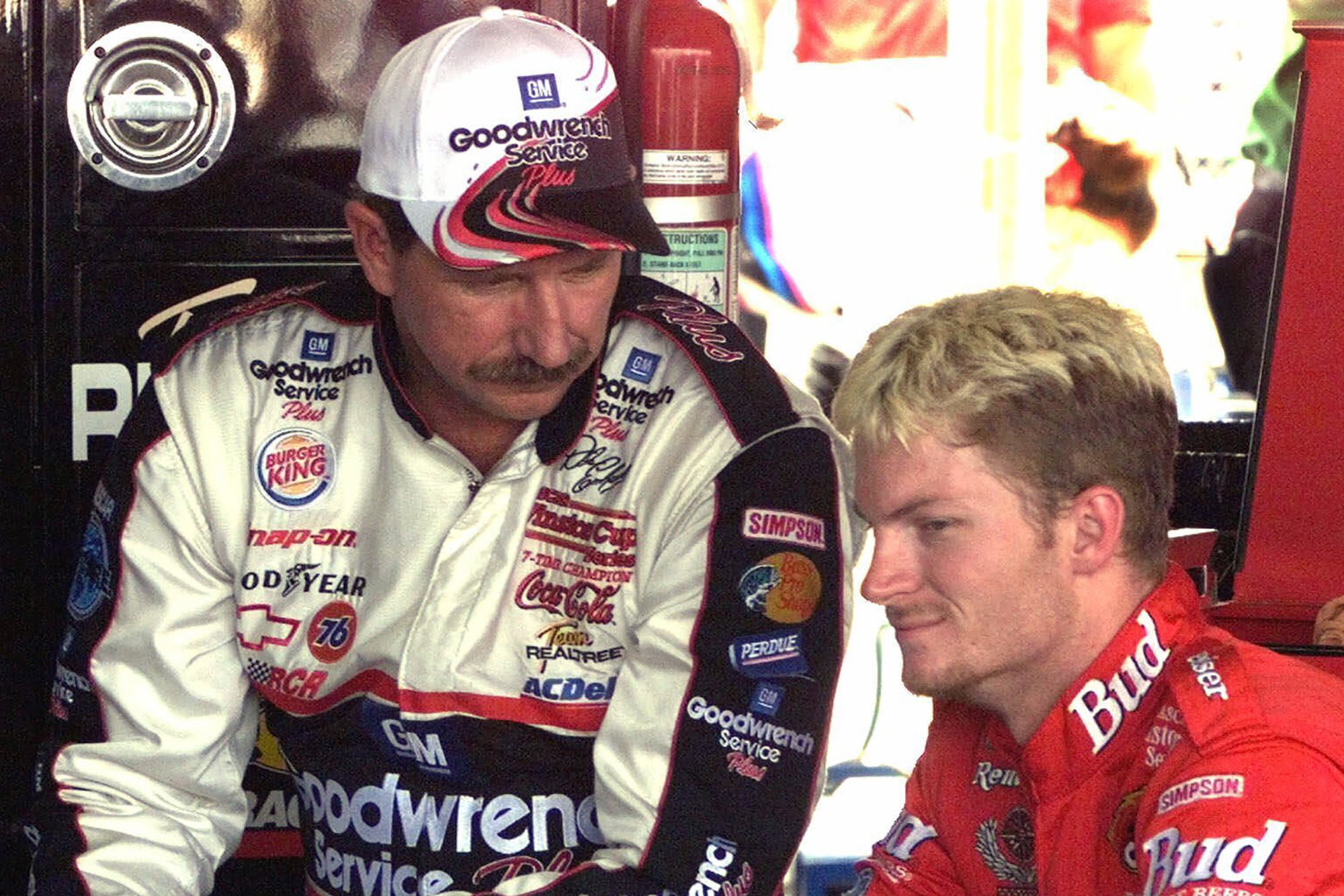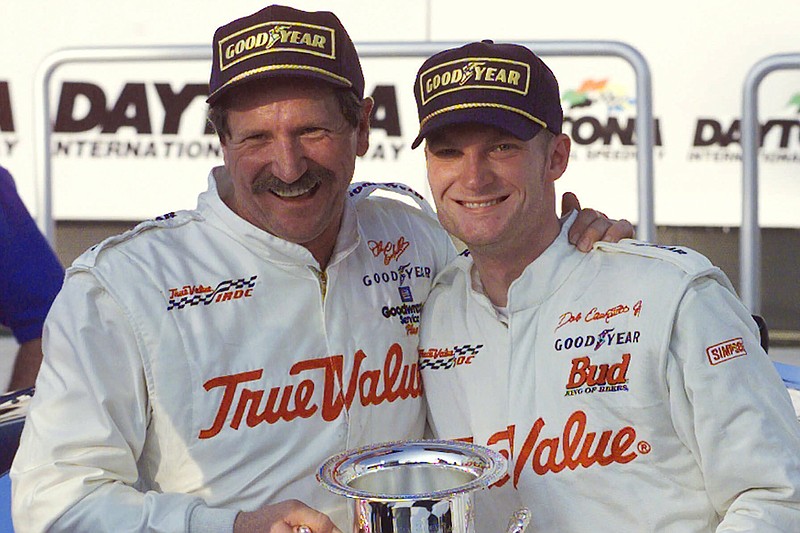CHARLOTTE, N.C. - Dale Earnhardt Jr. recognized early he would never be a seven-time Cup Series champion like his dad.
It was unrealistic to believe he would match the late Dale Earnhardt on the track. The Intimidator was tough as nails, didn't tolerate any nonsense and built a winning resumé that made him an easy choice for the NASCAR Hall of Fame's inaugural class of 2010.
Junior never hoisted the Cup, but he built a career as NASCAR's top ambassador, finding a crossover audience that stretches far beyond his father's reach.
"Once I realized that I wasn't going to match dad's statistics on paper ... to me, my dad was this really important part of the puzzle, and he was important because of his success but also because of the reaction to whatever he did," Earnhardt told The Associated Press this week. "I thought, 'Wow, that is an asset, that's what being an asset to the sport is, and this guy is valuable.' I wanted to have that same value."
Earnhardt, 47, will join his father in the NASCAR Hall of Fame on Friday night, when Junior is inducted alongside Red Farmer and Mike Stefanik. The Hall of Fame welcomed five members each of its first 11 years, then tweaked the rules to cut the inductees down to three for the 2021 class.
The headliner is Earnhardt, whose induction was postponed a full year by the coronavirus pandemic. He is being celebrated for his accomplishments behind the wheel - 26 career Cup Series victories that include a pair of Daytona 500 wins, as well as two season championships in NASCAR's second-tier series - but also for the enormous role he has taken on since his father was killed 21 years ago in a crash on the final lap of the Daytona 500.
Earnhardt was a rising star at the start of his second Cup Series season when his father died on Feb. 18, 2001, at age 49. His dad had built a powerhouse race team at Dale Earnhardt Inc. and persuaded Budweiser to sponsor his kid; the brewer went all in on introducing Junior to a mainstream audience.
The elder Earnhardt was a superstar, but his fan base was filled with the blue-collar folks who drove Chevrolets and wore Wranglers, just like their favorite driver.
Dale Jr. was profiled in Rolling Stone magazine and showed off the nightclub in his home on MTV's "Cribs." His crossover appeal landed him appearances in music videos for artists ranging from Trace Adkins to Nickelback to Jay-Z.
A lot of it seemed silly to his old man, but when Earnhardt died, his legacy immediately fell to a 25-year-old adjusting to his insane popularity. He admittedly suffers from severe anxiety, but Earnhardt navigated the heightened spotlight with brutal honesty and raw emotion.
The third-generation racer became a 15-time winner of NASCAR's fan-voted most popular driver award on the Cup Series, and over the past two decades he has built an empire centered around the sport his family holds in such high regard. Earnhardt has a successful media company, and his television special series "Lost Speedways" and his podcast "The Dale Jr. Download" are both fan favorites.
He teamed with his sister, Kelley, to grow their JR Motorsports race team into one of the best in the second-tier Xfinity Series, and as a lead analyst for NBC Sports he plays a huge role in how NASCAR is delivered to its audience.
The late Earnhardt never got to see what his children accomplished, creating a nagging void his son said he can't shake.
"I think he would be surprised," Earnhardt told AP.
He said his dad didn't believe his children would be successful race car drivers, so his two Busch Series titles caught him off guard.
"I think he certainly would be happy and proud, but also typical Dad going, 'Well, if you try a little harder here,' or 'If you had done a little different there,' and 'Maybe you should prioritize this,'" Earnhardt said. "That's exactly what I would expect from him, and I would welcome that type of criticism today."
 AP photo by Lou Krasky / NASCAR drivers Dale Earnhardt, left, and his son Dale Earnhardt Jr. chat in the garage at South Carolina's Darlington Raceway on Sept. 1, 2000, as they wait for Southern 500 qualifying to begin. While his father built an amazing legacy by winning a record-tying seven Cup Series championships, Junior enjoyed some on-track success but made major contributions as an ambassador who helped extend NASCAR's reach beyond its traditional audience.
AP photo by Lou Krasky / NASCAR drivers Dale Earnhardt, left, and his son Dale Earnhardt Jr. chat in the garage at South Carolina's Darlington Raceway on Sept. 1, 2000, as they wait for Southern 500 qualifying to begin. While his father built an amazing legacy by winning a record-tying seven Cup Series championships, Junior enjoyed some on-track success but made major contributions as an ambassador who helped extend NASCAR's reach beyond its traditional audience.Earnhardt left DEI six years after his father's death due to a difficult relationship with the elder Earnhardt's widow; the race team no longer exists. Junior's free agency courting was among the most frenzied in NASCAR history, and he moved to powerhouse Hendrick Motorsports in 2008.
He believes his father would think he fell short of his on-track potential. He agrees.
"Once I got to Hendrick and really realized what being a driver is about, and really understood what kind of commitment it takes, I look back on the Bud years and go, 'Wow, I really could have done so much more with that because I had some really awesome race cars and we had a hell of a team," Earnhardt said.
"There's some regrets and mistakes and things that I wish I would have done differently. Dad would have pointed those out for sure."
Earnhardt reluctantly embraces his off-track success, which includes an almost daily influence on NASCAR. He tested the new Cup Series car last week at Daytona International Speedway so he can accurately discuss it for an audience, and he lobbied the Hall of Fame to allow Stefanik's widow to give a speech at Friday night's ceremony.
He has always followed the belief he can convert NASCAR's toughest critic. And in his father's absence, he has spent two decades holding NASCAR's vice chairman Mike Helton in the highest regard, confident that if his father's close friend respects him, then he was doing things right.
And yet Earnhardt deflected what his father might think, crediting instead his sister, co-owner of JR Motorsports.
"I think that he would be so proud of Kelley and who she has become, the amount of respect, her stature, I think that would matter a lot to him," Earnhardt said. "He would credit her and tell me that's she a lot of the reason why we've accomplished everything we have. And he would be right. But, you know, he wouldn't tell her. He'd tell me about Kelley, and he'd talk to Kelley about me.
"I would do anything to hear what he thinks about all the things we've done and everything we've been involved in. I would just do anything to really, really truly know what his words would be. I think about it all the time."
